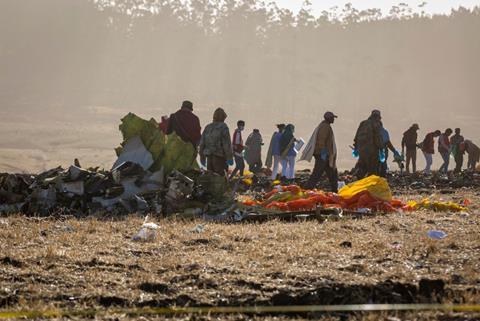The US Department of Justice (DOJ) is offering a settlement package to Boeing that would see the company plead guilty to fraud charges, pay a $244 million fine and be subject to continued government oversight.
Paul Cassell, an attorney representing families of victims killed by two 737 Max 8 crashes, says DOJ lawyers disclosed the proposed settlement package to his clients during a 30 June call.
Cassell calls the agreement a “sweetheart” deal that “does not hold Boeing accountable for killing 346 people”.
The agreement relates to the DOJ’s decision to prosecute Boeing for violating a 2021 deferred prosecution agreement (DPA).

During the 30 June conference call with families, DOJ attorneys said they intended to bring the proposed plea deal to Boeing for consideration, says Cassell.
“It will take Boeing approximately three seconds to accept this deal because it has to be one of the most-generous deals ever,” he adds.
The DOJ declines to comment. Boeing did not respond to a request for comment.
The DOJ filed criminal charges in a Texas federal court against Boeing in 2021 for defrauding the Federal Aviation Administration (FAA) during certification of the 737 Max.
It argues that former Boeing employees failed to inform the FAA about critical aspects of the 737 Max’s Maneuvering Characteristics Augmentation System – the flight-control system that put two 737 Max 8s into dives from which the pilots could not recover, killing 346 people.
Boeing sidestepped prosecution by signing the DPA, which set a total fine of $487.2 million – twice Boeing’s estimated financial gain from the fraud, Cassell notes.
But the DPA actually required Boeing to only pay half the fine, $243.6 million. It also required that the company pay $500 million in compensation to relatives of crash victims and $1.77 billion to airline customers, and to avoid future fraud.
On 14 May, following the January in-flight failure of a 737 Max 9’s mid-cabin door-plug, the DOJ said it determined Boeing had breached the DPA’s fraud-related requirements. The government at the time said it was considering whether to prosecute the company.
The DOJ has now made clear how it intends to proceed, according to Cassell. The government’s proposed plea deal would require Boeing pay the other half of the total fine – another $243.6 million. It would also subject the company to three years of oversight.
Cassell says DOJ lawyers framed the 30 June call with victims’ families as an opportunity to discuss possible paths forward, but says instead the department simply informed families of its proposed plea arrangement.
He describes the call, which lasted 2h due to resistance from relatives, as a DOJ effort to “pretend to meaningfully confer with the families”.
Cassell and other attorneys representing victims say the agreement would see Boeing plead guilty to fraud but, critically, to avoid admitting guilt for a role in killing the crash victims.
“The 737 Max families vigorously oppose the shameful new sweetheart deal between Boeing and the Department of Justice,” says Erin Applebaum, attorney with law firm Kreindler & Kreindler who also represents victims’ families. “The deal levies a negligible fine… and, most egregiously, completely fails to mention or recognise the dignity of the 346 people murdered by Boeing’s negligence.”
Cassell plans to challenge the government’s plea proposal with Judge Reed O’Connor, who is overseeing the case in US District Court for the Northern District of Texas.


























